HVAC Companies Cirencester
Find top HVAC Services in Cirencester
Get 3 FREE Air Conditioning Services quotes for your project today! Compare profiles, reviews, accreditations, portfolio, etc... and choose the best service.
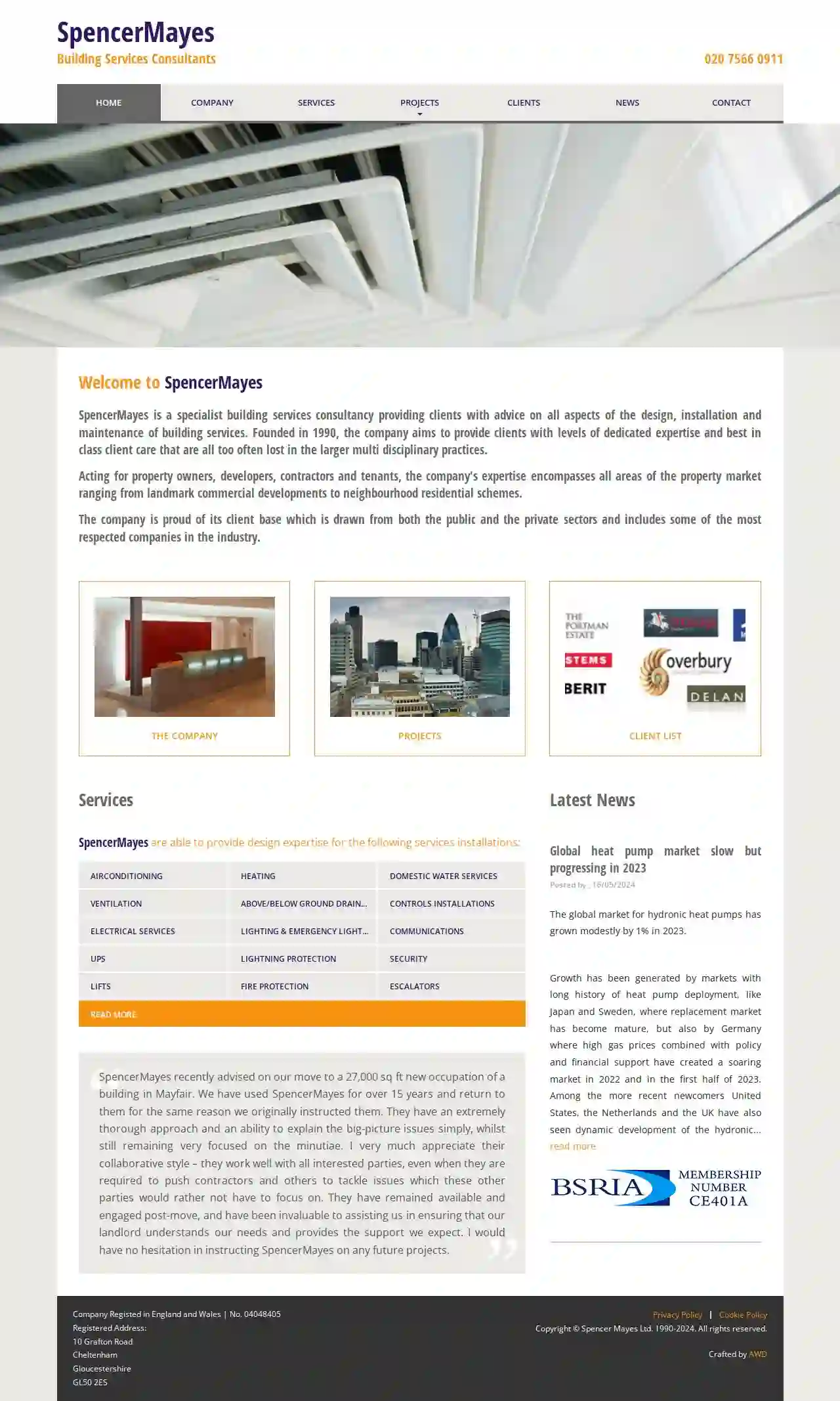
Spencer Mayes Ltd
10 Grafton Road, Cheltenham, GL50 2ES, GBSpencerMayes is a specialist building services consultancy, dedicated to providing clients with expert advice on all aspects of building services design, installation, and maintenance. Established in 1990, the company prides itself on delivering exceptional client care and in-depth expertise that is often lacking in larger, multi-disciplinary practices. SpencerMayes serves a diverse clientele, including property owners, developers, contractors, and tenants, across all sectors of the property market. From landmark commercial developments to neighbourhood residential schemes, their expertise spans a wide range. The company is proud to boast a client base drawn from both the public and private sectors, encompassing some of the industry's most respected names.
- Services
- Why Us?
- Testimonials
- Gallery
Get Quote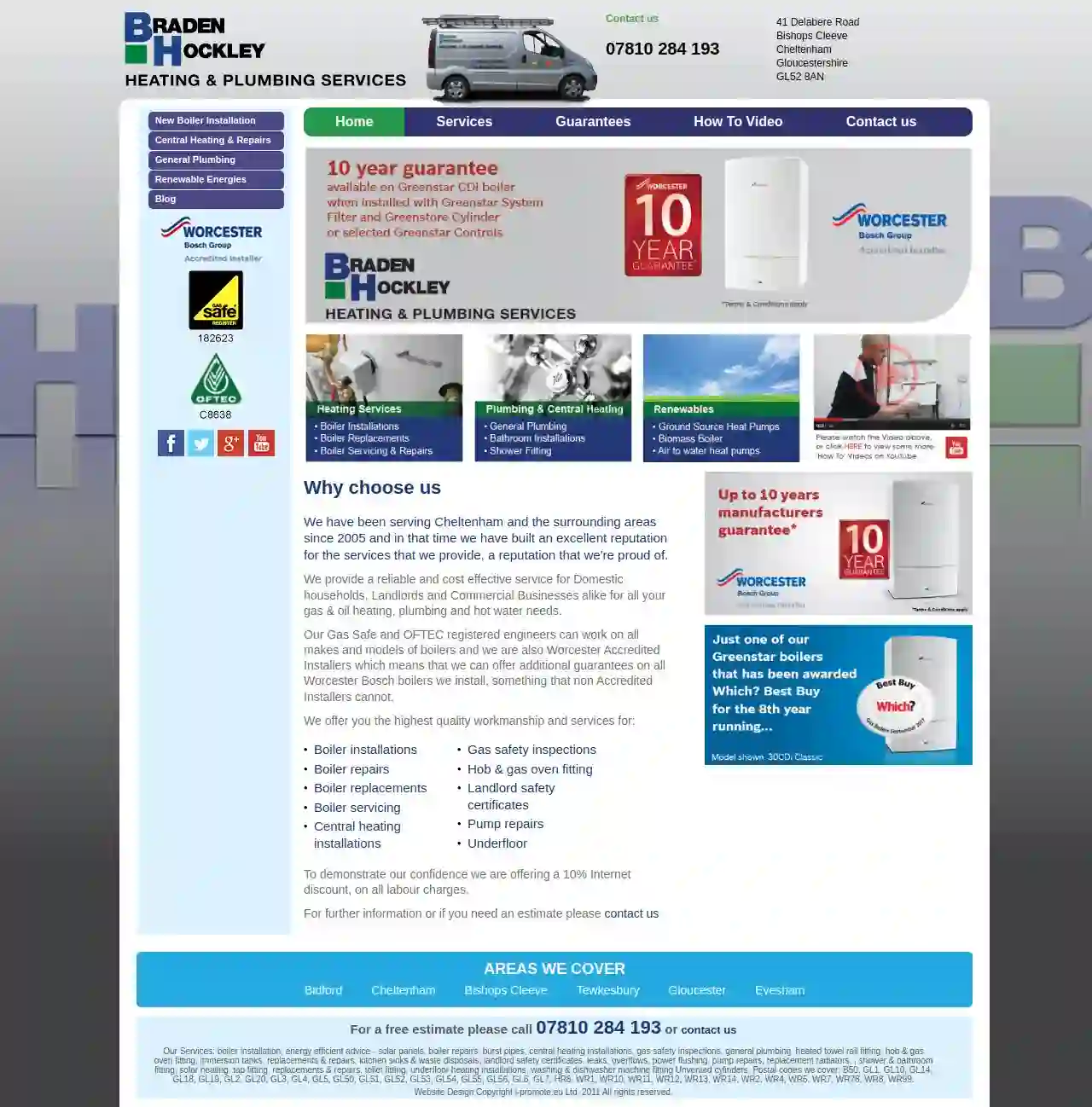
Braden Hockley Heating & Plumbing
51 reviews41 Delabere Road, Cheltenham, GL52 8AN, GBWe have been serving Cheltenham and the surrounding areas since 2005 and in that time we have built an excellent reputation for the services that we provide, a reputation that we're proud of. We provide a reliable and cost effective service for Domestic households, Landlords and Commercial Businesses alike for all your gas & oil heating, plumbing and hot water needs. Our Gas Safe and OFTEC registered engineers can work on all makes and models of boilers and we are also Worcester Accredited Installers which means that we can offer additional guarantees on all Worcester Bosch boilers we install, something that non Accredited Installers cannot. We offer you the highest quality workmanship and services for: Boiler installations Boiler repairs Boiler replacements Boiler servicing Central heating installations Gas safety inspections Hob & gas oven fitting Landlord safety certificates Pump repairs Underfloor To demonstrate our confidence we are offering a 10% Internet discount, on all labour charges. For further information or if you need an estimate please contact us
- Services
- Why Us?
- Accreditations
- Gallery
Get Quote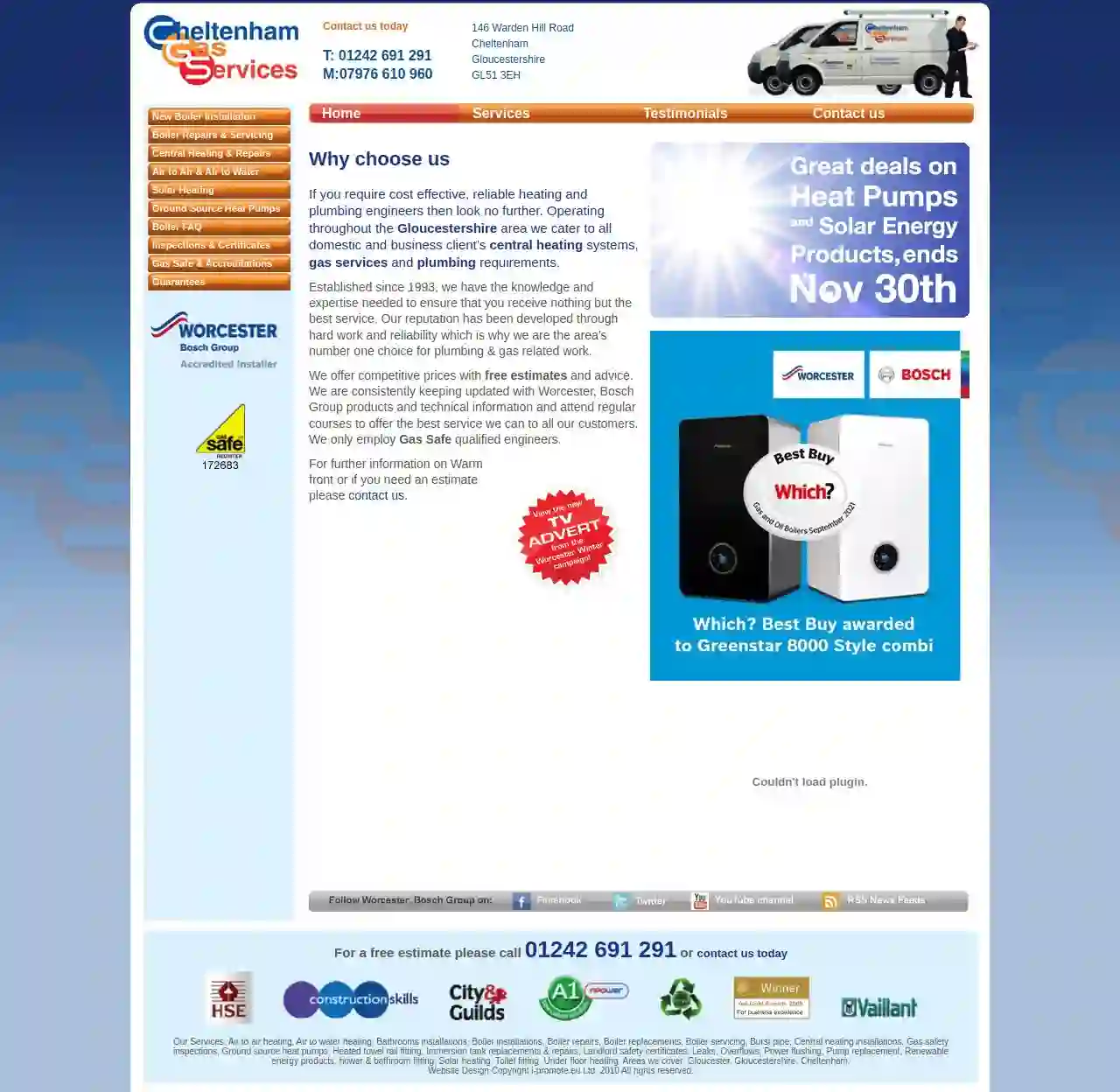
Cheltenham Gas Services
3.810 reviews146 Warden Hill Road, Cheltenham, GL51 3EH, GBIf you require cost effective, reliable heating and plumbing engineers then look no further. Operating throughout the Gloucestershire area we cater to all domestic and business client�s central heating systems, gas services and plumbing requirements.Established since 1993, we have the knowledge and expertise needed to ensure that you receive nothing but the best service. Our reputation has been developed through hard work and reliability which is why we are the area�s number one choice for plumbing & gas related work.We offer competitive prices with free estimates and advice. We are consistently keeping updated with Worcester, Bosch Group products and technical information and attend regular courses to offer the best service we can to all our customers. We only employ Gas Safe qualified engineers.For further information on Warm front or if you need an estimate please contact us.
- Services
- Why Us?
- Accreditations
- Testimonials
- Gallery
Get Quote
Headland Heating
54 reviews20 Matson Place, Gloucester, GL1 4PL, GBHeadland Heating is a Gas Safe registered heating engineer serving Gloucester and the surrounding areas. We specialize in all aspects of domestic and commercial plumbing and heating, from general repairs and installations to boiler servicing and new installations. We pride ourselves on providing a fast, reliable, and professional service at all times, while maintaining the highest quality of workmanship. Our team of experienced engineers is dedicated to exceeding customer expectations and ensuring complete satisfaction. We offer a 24/7 emergency call-out service for urgent repairs and breakdowns.
- Services
- Why Us?
- Accreditations
- Our Team
- Testimonials
- Gallery
Get Quote
GJC Plumbing and Heating Ltd
510 reviews48 Pilley Crescent, Cheltenham, GL539ET, GBReliable & Professional Plumbing & Heating Company Looking for first-class plumbing and central heating experts in the Cheltenham area? Look no further than GJC Plumbing and Heating. With years of experience, we cater to all your plumbing and gas needs, whether you're a homeowner or a business. Rest assured, we're Gas Safe registered (523839) and Oftec Qualified, prioritising your satisfaction and our reputation.We're proud to work closely with Gloucestershire's leading Estate and Letting Agencies, offering unmatched maintenance services for landlords and managed properties. When it comes to plumbers in Gloucestershire, we guarantee you won't find better. Contact us today for all your oil, plumbing, heating, and gas needs. READ MORE
- Services
- Why Us?
- Accreditations
- Our Team
- Testimonials
- Gallery
Get Quote
Lovatts Heating Limited
4.217 reviewsUnit 2, Whiteway Court, The Whiteway, Cirencester, GL7 7BA, GBLovatts Heating Ltd is a family-run business established in 1972, specialising in boiler replacements and installing central heating and underfloor heating systems. We cover a large area which includes Cirencester, Stroud, Tetbury, Malmesbury, Minety, Cricklade, Lechlade, Burford, Northleach and Cheltenham covering all outlying villages around these key areas. Our business was originally started by John Lovatt who is still at the helm. We started as a central heating installation business but due to high demand from customers, we quickly expanded our services to include boiler servicing and repairs. As many of the outlying villages do not have natural gas, most houses have either oil boilers or LPG boilers installed. We service and install both oil and LPG boilers as well as the natural gas boilers in the towns. Due to more and more houses being converted into flats, electric Electrastream boilers are being installed and we specialise in the servicing and repairs of these units.
- Services
- Why Us?
- Accreditations
- Our Team
- Testimonials
- Gallery
Get Quote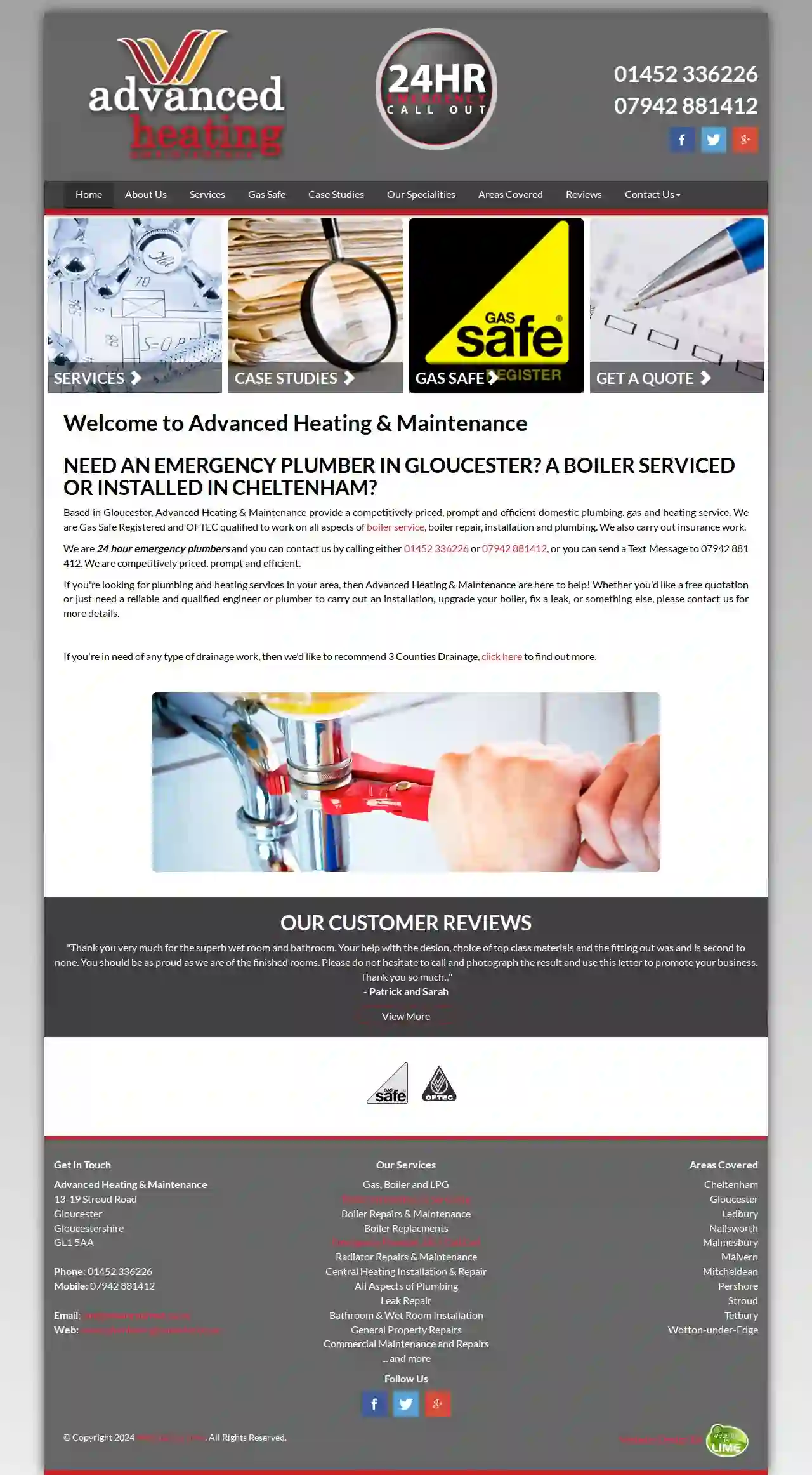
Advanced Heat Maintenance
36 reviews13-19 Stroud Road, Gloucester, GL1 5AA, GBWelcome to Advanced Heating & Maintenance, a local boiler service, repair and installation specialist based in Gloucester. We provide a competitively priced, prompt and efficient gas and heating service, and also undertake insurance work. Our plumbing and gas heating engineers are Gas Safe and OFTEC registered, meaning we are qualified to work with all aspects of gas, heating and plumbing. We work across an area that includes Cheltenham, Gloucester, Ledbury, Malmesbury, Malvern, Mitcheldean, Pershore, Stroud, Nailsworth, Tetbury and Wotton-under-Edge. If you're not sure whether your area is included, please ask. We are 24 hour emergency plumbers and you can contact us by calling either 01452 336226 or 07942 881412, or you can send a Text Message to 07942 881 412. We are competitively priced, prompt and efficient. If you're looking for plumbing and heating services in your area, then Advanced Heating & Maintenance are here to help! Whether you'd like a free quotation or just need a reliable and qualified engineer or plumber to carry out an installation, upgrade your boiler, fix a leak, or something else, please contact us for more details.
- Services
- Why Us?
- Accreditations
- Our Team
- Testimonials
- Gallery
Get Quote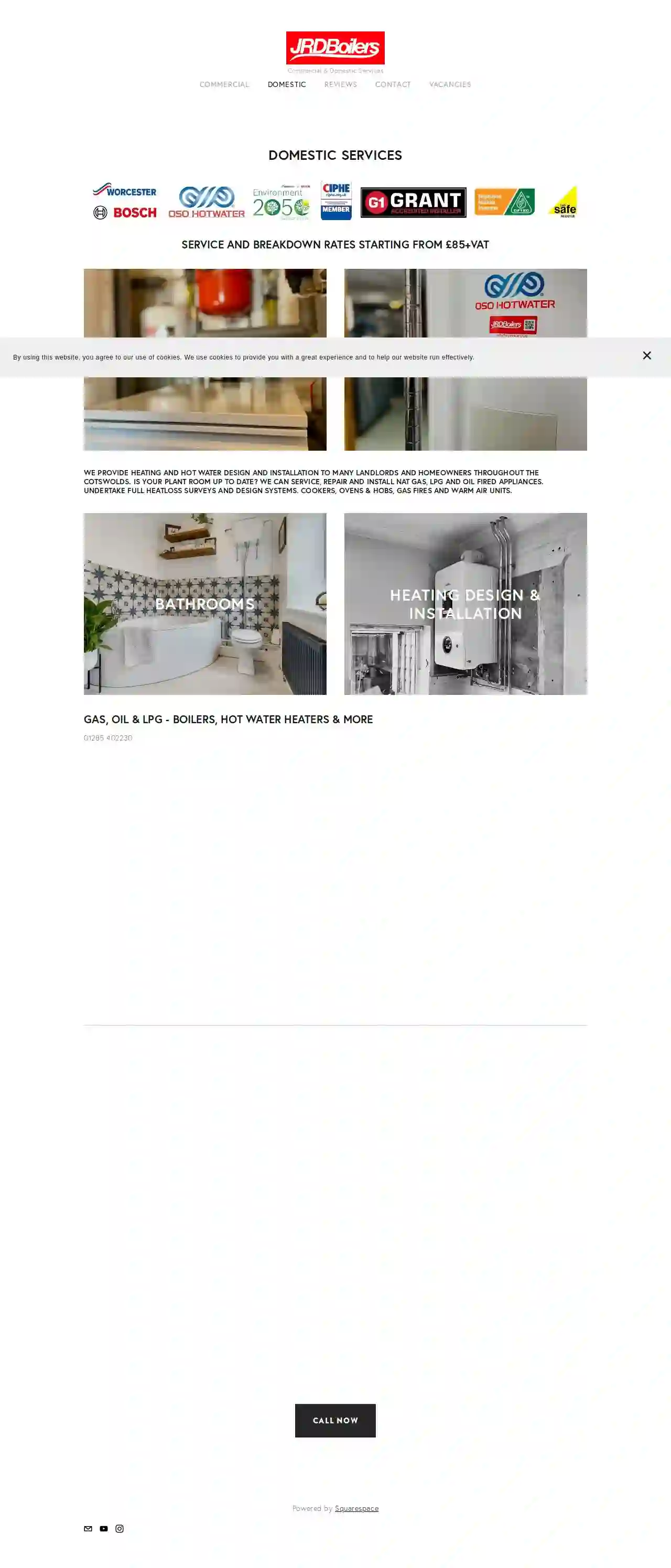
JRD Boilers Limited
52 reviewsGloucester, GBWE PROVIDE HEATING AND HOT WATER DESIGN AND INSTALLATION TO MANY LANDLORDS AND HOMEOWNERS THROUGHOUT THE COTSWOLDS. IS YOUR PLANT ROOM UP TO DATE? WE CAN SERVICE, REPAIR AND INSTALL NAT GAS, LPG AND OIL FIRED APPLIANCES. UNDERTAKE FULL HEATLOSS SURVEYS AND DESIGN SYSTEMS. COOKERS, OVENS & HOBS, GAS FIRES AND WARM AIR UNITS.
- Services
- Why Us?
- Testimonials
- Gallery
Get Quote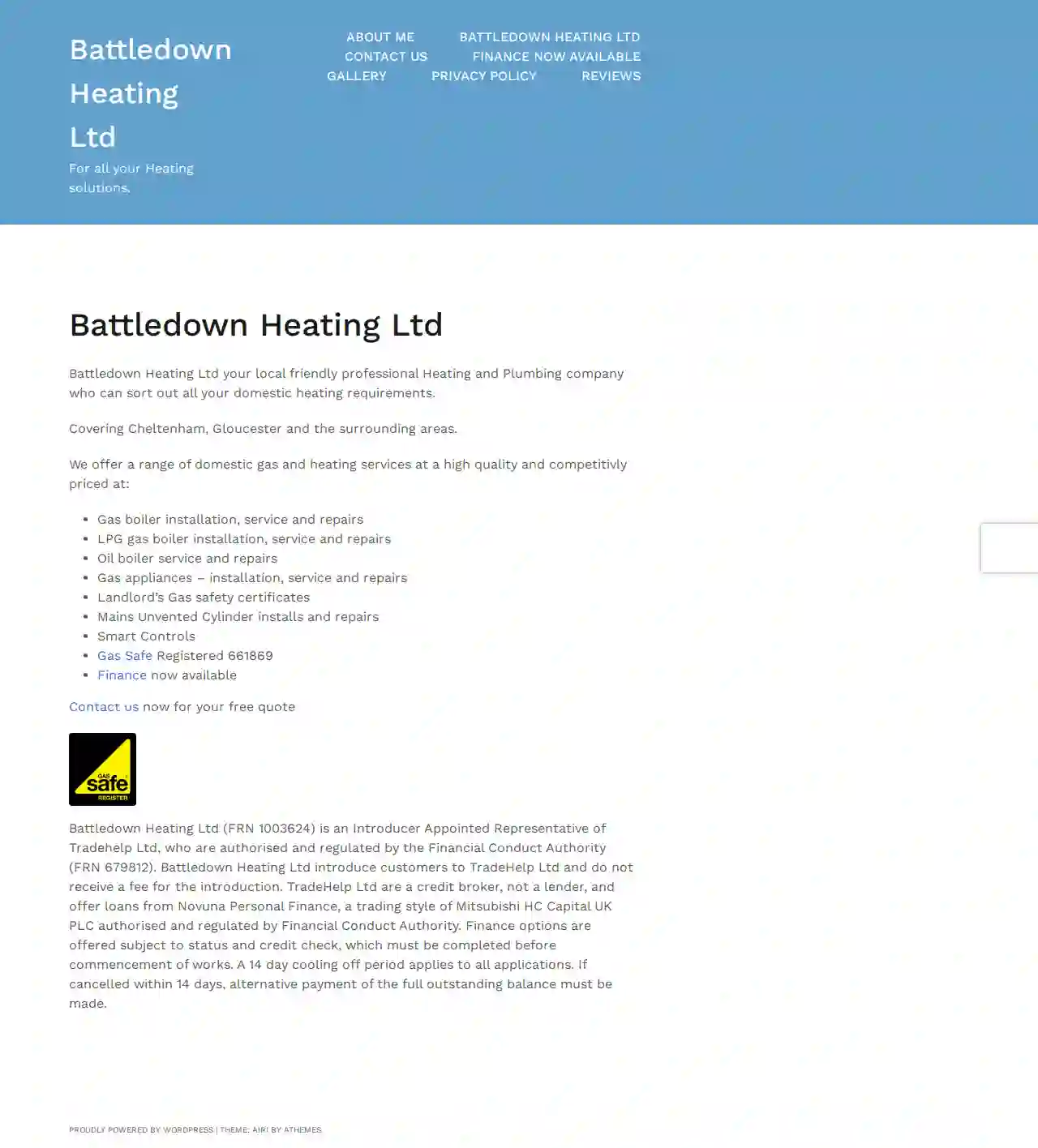
Battledown Heating Ltd
57 reviewsCheltenham, GBBattledown Heating Ltd is your local friendly professional Heating and Plumbing company who can sort out all your domestic heating requirements. We cover Cheltenham, Gloucester and the surrounding areas. We offer a range of domestic gas and heating services at a high quality and competitively priced at: Gas boiler installation, service and repairs, LPG gas boiler installation, service and repairs, Oil boiler service and repairs, Gas appliances – installation, service and repairs, Landlord’s Gas safety certificates, Mains Unvented Cylinder installs and repairs, Smart Controls. We are Gas Safe Registered 661869. Finance now available.
- Services
- Why Us?
- Gallery
Get Quote
Paone Mechanical Inc.
556 reviewsGloucester, GBTrust In Paone Mechanical With Paone Mechanical your home comfort is on time and on budget. Paone Mechanical has provided Gloucester, MA & surrounding areas with quality residential & commercial HVAC services since 2001. Request Your Free Estimate Financing Options ASK US ABOUT MASS SAVE REBATES! $10,000 available when you switch your whole home heat source to heat pumps or $1,250 per ton up to $10,000. New Heat Pump System Installed As low as $99/mo. Cannot be combined with other offers. Restrictions may apply. More Info iWaveR Air Cleaner - $950, save $300 Reduce air borne viruses and bacterias in your home. Cannot be combined with other offers. Restrictions may apply. More Info AC System Tune-Up $99/per system. Reg Price: $150 Cannot be combined with other offers. Restrictions may apply. More Info Schedule A Repair No matter what make or model, our highly trained team will be able to help ensure your system is running effectively and efficiently. More Info Upgrade Your System We install only the best, and most affordable systems. Click below to learn about our financing options, or fill out the form to get started! More Info Request Maintenance We offer a comprehensive maintenance program that can be customized to your needs. Call us at (978) 228-5230 to learn more. More Info Quick Form No need to wait! Simply click on one the the services to the side, or choose a service from the list below and hit send. One of our specialists will be in touch ASAP. Your Name* Your PhoneYour Email Address* How Can We Help?*Please Select An Option...ServiceInstallationRepairOther What Makes Us Different? Click To Find Out On Time and On Budget For top of the line residential and commercial HVAC services in Gloucester, MA & surrounding areas, call on the professionals from Paone Mechanical. We offer a complete range of heating, ventilation, air conditioning, and refrigeration options, including installation, repair, and maintenance of all makes and models. Family owned and operated, we prioritize higher quality work, tailoring our recommendations to the customer’s needs and goals. Our small team of technicians creates a family-oriented, boutique style atmosphere, translating into more personalized attention and superior rewards. Get in touch with Paone Mechanical for a free estimate anywhere throughout Gloucester, Essex, Rockport, Manchester-by-the-Sea, Ipswich, Hamilton, Wenham & Beverly, MA. We encourage you to browse our broad spectrum of services, take advantage of our dedication to satisfaction
- Services
- Why Us?
- Accreditations
- Our Team
- Testimonials
- Gallery
Get Quote
Over 12,692+ HVAC Contractors in our network
Our HVAC experts operate in Cirencester and surrounding areas!
HVACCompaniesHub has curated and vetted Top HVAC Companies in Cirencester. Find the most reliable pro today.
Frequently Asked Questions About HVAC Companies
- Your home's square footage
- Your local climate
- Insulation levels
- Window efficiency
- Number of occupants
- Experience and Expertise: Look for installers with experience and a good understanding of AC systems.
- Licensing and Insurance: Make sure the installer is licensed and insured to work in your area.
- Reputation and Reviews: Check online reviews and ratings from other customers.
- Detailed Quotes: Get itemized quotes outlining all costs associated with the installation.
- Warranties: Inquire about warranties on equipment and labor.
- References: Ask for and check references from past customers.
- Communication: Choose an installer who communicates clearly and promptly.
- Check Online Reviews: Look for HVAC companies with positive reviews and high ratings on platforms like Google, Yelp, and others.
- Ask for Referrals: Reach out to friends, family, neighbors, or colleagues for recommendations.
- Verify Licensing and Insurance: Ensure the company is properly licensed and insured to operate in your area.
- Look for Certifications: Check for certifications from reputable organizations like NATE (North American Technician Excellence).
- Compare Quotes: Get quotes from multiple HVAC companies to compare pricing and services.
- Use a Directory like HVACCompaniesHub: Simplify your search by using our directory of pre-screened and qualified HVAC professionals.
How do I choose the right size AC unit for my home?
What should I look for when hiring an AC installer?
What is the difference between an AC unit and a heat pump?
How do I find a good HVAC company near me?
Finding a reputable HVAC company requires research. Consider these tips:
How do I choose the right size AC unit for my home?
- Your home's square footage
- Your local climate
- Insulation levels
- Window efficiency
- Number of occupants
What should I look for when hiring an AC installer?
- Experience and Expertise: Look for installers with experience and a good understanding of AC systems.
- Licensing and Insurance: Make sure the installer is licensed and insured to work in your area.
- Reputation and Reviews: Check online reviews and ratings from other customers.
- Detailed Quotes: Get itemized quotes outlining all costs associated with the installation.
- Warranties: Inquire about warranties on equipment and labor.
- References: Ask for and check references from past customers.
- Communication: Choose an installer who communicates clearly and promptly.
What is the difference between an AC unit and a heat pump?
How do I find a good HVAC company near me?
Finding a reputable HVAC company requires research. Consider these tips:
- Check Online Reviews: Look for HVAC companies with positive reviews and high ratings on platforms like Google, Yelp, and others.
- Ask for Referrals: Reach out to friends, family, neighbors, or colleagues for recommendations.
- Verify Licensing and Insurance: Ensure the company is properly licensed and insured to operate in your area.
- Look for Certifications: Check for certifications from reputable organizations like NATE (North American Technician Excellence).
- Compare Quotes: Get quotes from multiple HVAC companies to compare pricing and services.
- Use a Directory like HVACCompaniesHub: Simplify your search by using our directory of pre-screened and qualified HVAC professionals.